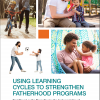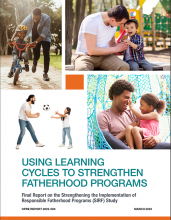0
Report
Community:
May 1, 2023
Federally funded Responsible Fatherhood programs work with fathers to promote healthy relationships and marriages, strengthen parenting practices, and help fathers attain economic stability. For programs to improve fathers’ outcomes, they need to be able to recruit fathers, engage them in services, and keep them actively participating in program activities. However, it is challenging for programs to achieve these participation goals. The Strengthening the Implementation of Responsible Fatherhood Programs (SIRF) study was designed to strengthen programs and build evidence on promising practices to improve the enrollment, engagement, and retention of fathers in program activities. Fatherhood programs participating in SIRF iteratively implemented and assessed promising approaches to addressing implementation challenges, with the support of and in partnership with the SIRF team.
Authored by: Charles Michalopoulos, Emily Marano, Becca Heilman, Michelle S. Manno, Patrizia Mancini, Scott Cody for MDRC
Topics: Family engagement, Healthy homes, Legislation & Policy, Low-income, Research, Stability
 Shared by Sandra Ware
Shared by Sandra Ware
Sandra Ware posted a
on Jun 1, 2023
Charles Michalopoulos, Emily Marano, Becca Heilman, Michelle S. Manno, Patrizia Mancini, Scott Cody for MDRC
Federally funded Responsible Fatherhood programs work with fathers to promote healthy relationships and marriages, strengthen parenting practices, and help fathers attain economic stability.
0
Report
Community:
Jun 1, 2023
Every May, Ascend recognizes the importance of raising awareness about mental health and the multifaceted ways that it impacts family prosperity and well-being. Even as Mental Health Awareness Month comes to a close, we are committed every day to uplifting the drumbeat across our community that calls for an end to mental health stigma, making strides to ensure that families can access quality services, and advocating for policies that support families' unique mental health needs.
Join us in the national movement to raise awareness about mental health by exploring some of our new resources and sharing them with your community of changemakers!
Authored by: Ascend and the Jed Foundation for Ascend
Topics: Depression, Dual-generation, Education, Legislation & Policy, Mental health, Research
 Shared by Sandra Ware
Shared by Sandra Ware
Sandra Ware posted a
on Jun 1, 2023
Ascend and the Jed Foundation for Ascend
Every May, Ascend recognizes the importance of raising awareness about mental health and the multifaceted ways that it impacts family prosperity and well-being.
0
Report
Community:
Feb 7, 2023

In the 2020-21 school year, more than 25 million children and youth – roughly half of all elementary and secondary students in the United States – attended schools in school districts that lacked dedicated funding to identify and support students experiencing homelessness. This significant funding gap increases the likelihood that many children and youth experiencing homelessness will not be identified, and even in cases where they are identified, that they will not receive the educational protections and services that can stabilize their education and their lives. Ensuring access to these supports is an important part of creating a school system that meets the needs of all our nation’s children and youth. SchoolHouse Connection and Poverty Solutions at the University of Michigan analyzed publicly-available preK-12 federal education data for the 2020-2021 school year to examine patterns that are correlated with under-identifying and inadequately supporting children and youth experiencing homelessness.
Authored by: SchoolHouse Connection and University of Michigan
Topics: Early childhood, Education, Funding, Homelessness, Low-income, Research, School-readiness, Stability, Youth
 Shared by Sandra Ware
Shared by Sandra Ware
Sandra Ware posted a
on Feb 21, 2023
SchoolHouse Connection and University of Michigan
In the 2020-21 school year, more than 25 million children and youth – roughly half of all elementary and secondary students in the United States – attended schools in school districts that lacked dedicated funding to identify and support students experiencing homelessness.
0
Report
Community:
Nov 17, 2022
Homelessness is a traumatic experience with long-term consequences, particularly for infants and toddlers in their most critical stages of development. Yet homelessness among young children is hidden. Lack of shelter, fear of having children removed from parental custody, and restrictive eligibility criteria for housing programs mean that most young children experiencing homelessness stay in places that are not easily identified.
To this end, SchoolHouse Connection and Poverty Solutions at the University of Michigan analyzed data from twenty states that have formed broad-based coalitions to move prenatal-to-3 priorities forward.
This report describes the prevalence of homelessness among infants and toddlers in these twenty states; gaps in access to early learning programs; and recommendations for increasing enrollment and support.
Authored by: School House Connection
Topics: Child welfare, COVID-19, Early childhood, Education, Foster care, Homelessness, Legislation & Policy, Pre-natal, Racial inequalities, Research, Youth
 Shared by Sandra Ware
Shared by Sandra Ware
Sandra Ware posted a
on Nov 17, 2022
Homelessness is a traumatic experience with long-term consequences, particularly for infants and toddlers in their most critical stages of development. Yet homelessness among young children is hidden.
0
Report
Community:
Sep 27, 2022
Human Rights Watch report on Public housing- How US Underfunding Public Housing Harms Rights in New York, New Mexico, and Beyond
Authored by: Human Rights Watch
Topics: Funding, Housing, Low-income, Racial inequalities, Research
 Shared by Sandra Ware
Shared by Sandra Ware
Sandra Ware posted a
on Oct 11, 2022
Human Rights Watch report on Public housing- How US Underfunding Public Housing Harms Rights in New York, New Mexico, and Beyond
0
Report
Community:
Oct 6, 2022
During the pandemic, many older adults faced social isolation and disruptions in access to food, medical care, and supportive services. In response, organizations that support older people improvised solutions to address these challenges. This report, co-authored with The Hastings Center, examines how these responses, most of which were intended to be temporary, might improve housing and supports for older adults and address longstanding inequities.
Authored by: Joint Center for Housing Studies of Harvard University and the Hastings Center
Topics: Health, Research
 Shared by Camille Anoll-Hunter
Shared by Camille Anoll-Hunter
Camille Anoll-Hunter posted a
on Oct 6, 2022
Joint Center for Housing Studies of Harvard University and the Hastings Center
During the pandemic, many older adults faced social isolation and disruptions in access to food, medical care, and supportive services. In response, organizations that support older people improvised solutions to address these challenges.
0
Report
Community:
Aug 26, 2022
But availability of federal infrastructure money creates opportunities to close service gaps
Authored by: PEW, Anna Read & Kelly Wert
Topics: Research
 Shared by Camille Anoll-Hunter
Shared by Camille Anoll-Hunter
Camille Anoll-Hunter posted a
on Sep 2, 2022
PEW, Anna Read & Kelly Wert
But availability of federal infrastructure money creates opportunities to close service gaps
0
Report
Community:
Jun 27, 2022
We have an abundance of talent that is ready to reimagine early childhood and well-being in America for our youngest children and families, but we do not have an abundance of leadership experiences that nurture, propel, and position them as the dynamic leaders our country urgently needs.
Leadership that reflects the full diversity and genius of our communities, sectors, identities, and lived experiences matters now more than ever. In Toward A More Equitable Tomorrow: A Landscape Analysis of Early Childhood Leadership, we uncover the essentials for future leadership investments that value and center equity—especially racial equity and inclusion—to surface new possibilities and equitable prosperity moving forward. Insights from stakeholders including state and federal cabinet directors, service providers, funders, and parents offer powerful perspectives to guide the future early childhood field, and guide those who seek to accelerate families’ well-being, educational success, and economic mobility.
Ascend at the Aspen Institute is embracing this moment as a renewal, and also as a redoubling of our commitment to remake our systems and our society. This means centering children and families with a focus not simply on eliminating persistent inequities such as poverty, polarization, and racism, but on ensuring pathways to prosperity and well-being.
With support from the Buffett Early Childhood Fund, David and Lucile Packard Foundation, and the Bezos Family Foundation, Ascend undertook a robust landscape analysis of the early childhood field. More than 80 leaders—from research, practice, policy, philanthropy, and families with young children—shared their insights for this report. It was augmented by a review of 20 mission-aligned leadership efforts. Our inquiry was grounded in an intentional focus on racial, economic, and gender equity; respect for the advances made; commitment to innovation; and an open mind to new approaches, possibilities, and power.
Authored by: Ascend at the Aspen Institute
Topics: Advocacy, Asset building, Child welfare, CLPHA, Early childhood, Housing, Legislation & Policy, Racial inequalities, Research, Supportive housing, Sustainability, Youth
 Shared by Karina George
Shared by Karina George
Karina George posted a
on Jun 27, 2022
Ascend at the Aspen Institute
We have an abundance of talent that is ready to reimagine early childhood and well-being in America for our youngest children and families, but we do not have an abundance of leadership experiences that nurture, propel, and position them as the dynamic leaders our country urgently needs.
0
Report
Community:
Jun 27, 2022
A robust research base indicates the importance of high quality early care and education in relation to a host of long term health, education, and employment outcomes. The concept of “quality” in these programs has been the focus of much attention and resources, particularly over the last decade. Most states have established definitions of quality through quality rating and improvement systems (QRIS) and allocated accompanying resources to support early care and education providers to progress toward higher levels of quality. Unfortunately, with few exceptions, definitions of “quality” have been sorely lacking attention to equity and to the unique experiences that disproportionately affect children from historically marginalized communities.
This report addresses a fundamental content flaw in QRISs by operationalizing equity indicators. These indicators are grounded and organized by the CEP’s 14 priorities to advance equity in early care and education systems, published in a 2020 report, in partnership with eight national organizations. States can use these indicators to inform QRIS redesign efforts to advance equity and improve transparency for families.
Authored by: The Children's Equity Project (CEP)
Topics: Advocacy, CLPHA, Communications, Homelessness, Housing, Legislation & Policy, Metrics, Racial inequalities, Research, Supportive housing, Sustainability
 Shared by Karina George
Shared by Karina George
Karina George posted a
on Jun 27, 2022
The Children's Equity Project (CEP)
A robust research base indicates the importance of high quality early care and education in relation to a host of long term health, education, and employment outcomes. The concept of “quality” in these programs has been the focus of much attention and resources, particularly over the last decade.
0
Report
Community:
Apr 11, 2022
Educators play an important role in supporting students' mental well-being. The pandemic has added incredible layers of stress for both adults and young people. Although educators can't control all the stressors and sources of trauma affecting them, they can foster healing and wellness in their classroom or program and work to remove the stigma around mental health concerns.
Authored by: First Book Research & Insights
Topics: Advocacy, Depression, Early childhood, Education, Health, Healthy homes, Literacy, Low-income, Mental health, Racial inequalities, Research, School-readiness, Youth
 Shared by Stephanie Gray
Shared by Stephanie Gray
Stephanie Gray posted a
on Apr 11, 2022
First Book Research & Insights
Educators play an important role in supporting students' mental well-being. The pandemic has added incredible layers of stress for both adults and young people.
0
Report
Community:
Jun 20, 2017
Over the past year, the United States Conference of Mayors and the Brookings Institution, along with the Project for Public Spaces have worked together to capture a new model of growth that is emerging in cities and the particular roles that mayors can play.
This handbook offers concrete strategies for mayors and their administrations to facilitate the rise of innovation districts—small geographic areas within cities where research universities, medical institutions, and companies cluster and connect with start-ups, accelerators, and incubators. They reflect profound market and demographic dynamics that are revaluing proximity, density, walkability, and accessibility—in other words, the natural strengths of cities.
Authored by: Julie Wagner for BROOKINGS
Topics: Community development, Legislation & Policy, Research, Workforce development
 Shared by Housing Is
Shared by Housing Is
Housing Is posted a
on Oct 20, 2020
Julie Wagner for BROOKINGS
Over the past year, the United States Conference of Mayors and the Brookings Institution, along with the Project for Public Spaces have worked together to capture a new model of growth that is emerging in cities and the particular roles that mayors can play.
This handbook offers concrete strategi
0
Report
Community:
Nov 7, 2019
How Housing Programs Can Support the Educational Needs of Children Living in Publicly Supported Homes
Authored by: Public and Affordable Housing Research Corporation
Topics: Attendance, Broadband, Child welfare, Early childhood, Health, Housing, Literacy, Low-income, Out-of-school time, Partnerships, Place-based, Research, School-readiness
 Shared by Kelly McElwain
Shared by Kelly McElwain
Kelly McElwain posted a
on Nov 7, 2019
Public and Affordable Housing Research Corporation
How Housing Programs Can Support the Educational Needs of Children Living in Publicly Supported Homes
0
Report
Community:
Jun 6, 2019
Trends in Housing Assistance and Who it Serves
Authored by: PAHRC
Topics: Community development, Disabilities, Education, Funding, Health, Homelessness, Housing, Legislation & Policy, Low-income, Partnerships, Research, Seniors, Workforce development, Youth
 Shared by Keely Stater
Shared by Keely Stater
Keely Stater posted a
on Sep 10, 2019
Trends in Housing Assistance and Who it Serves
0
Report
Community:
In 2017, the Bipartisan Policy Center and the Center for Outcomes Research and Education (CORE) spoke with over 90 national thought leaders and stakeholders about the current state of rural health care in the Upper Midwest region, including Iowa, Minnesota, Montana, Nebraska, North Dakota, South Dakota, and Wyoming. BPC and CORE used these discussions to determine the real-world implications of existing federal policies, to understand ongoing care challenges, and to identify opportunities for improvement in rural health care access and delivery.
Authored by: Bipartisan Policy Center
Topics: Health, Low-income, Midwest, Research, Seniors
 Shared by Housing Is
Shared by Housing Is
Housing Is posted a
on Jun 12, 2019
In 2017, the Bipartisan Policy Center and the Center for Outcomes Research and Education (CORE) spoke with over 90 national thought leaders and stakeholders about the current state of rural health care in the Upper Midwest region, including Iowa, Minnesota, Montana, Nebraska, North Dakota, South Dak
0
Report
Community:
Apr 3, 2019
Rental affordability is a significant challenge for metropolitan statistical areas (MSAs) across the United States. The vast majority of the units Freddie Mac finances are affordable. Even so, our research shows that supply just hasn’t kept pace with demand in many metros, and that’s pushing affordable rents out of reach for millions of American families.
Authored by: Steve Guggenmos for Freddie Mac Multifamily
Topics: Community development, Housing, Research
 Shared by Housing Is
Shared by Housing Is
Housing Is posted a
on Jun 5, 2019
Steve Guggenmos for Freddie Mac Multifamily
Rental affordability is a significant challenge for metropolitan statistical areas (MSAs) across the United States. The vast majority of the units Freddie Mac finances are affordable.
0
Report
Community:
May 1, 2019
Community eligibility allows high-poverty schools and school districts to offer free meals to all students, and it eliminates the need for household school meal applications. A key piece of the Healthy, Hunger-Free Kids Act of 2010, community eligibility was phased in a few states at a time before it was made available to schools nationwide in the 2014–2015 school year.
Authored by: Food Research & Action Center (FRAC)
Topics: Child welfare, Education, Food insecurity, Legislation & Policy, Low-income, Nutrition, Out-of-school time, Research
 Shared by Housing Is
Shared by Housing Is
Housing Is posted a
on Jun 3, 2019
Food Research & Action Center (FRAC)
Community eligibility allows high-poverty schools and school districts to offer free meals to all students, and it eliminates the need for household school meal applications.
0
Report
Community:
Apr 25, 2019
Access to affordable child care can be a major barrier for low-income parents who want to participate in education and training activities to gain skills or obtain employment. Child care assistance from the Child Care and Development Fund (CCDF), the federal block grant that funds states to provide child care assistance to low-income families, can help alleviate this barrier and make it easier for low-income parents to participate in activities that improve their skills and lead to stable employment with adequate pay. However, the CCDF eligibility requirements and priorities for service are set at the state level, and states make different decisions about how to allocate scarce CCDF resources, so access to and use of CCDF subsidies for parents seeking education and training varies across states.
Authored by: Semhar Gebrekristos and Gina Adams for The Urban Institute
Topics: Child welfare, Early childhood, Education, Legislation & Policy, Post-secondary, Research, Workforce development
 Shared by Housing Is
Shared by Housing Is
Housing Is posted a
on May 30, 2019
Semhar Gebrekristos and Gina Adams for The Urban Institute
Access to affordable child care can be a major barrier for low-income parents who want to participate in education and training activities to gain skills or obtain employment.
0
Report
Community:
Oct 17, 2018
The primary objectives of this study are (1) to provide insights into the factors associated with landlord decisions about whether to participate in the HCV program and (2) to identify a collection of promising and innovative practices that Public Housing Authorities (PHAs) have used to increase landlord participation in the HCV program, especially in these low-poverty neighborhoods. This study employs a mixed-method research design composed of quantitative and qualitative components.
Authored by: Department of Housing and Urban Development (HUD), Office of Policy Development and Research
Topics: Housing, Low-income, Research
 Shared by Housing Is
Shared by Housing Is
Housing Is posted a
on May 29, 2019
Department of Housing and Urban Development (HUD), Office of Policy Development and Research
The primary objectives of this study are (1) to provide insights into the factors associated with landlord decisions about whether to participate in the HCV program and (2) to identify a collection of promising and innovative practices that Public Housing Authorities (PHAs) have used to increase lan
0
Report
Community:
May 1, 2019
Child poverty is an urgent and preventable crisis. Solutions to child poverty already exist if we just expand and invest in them. Benefits like nutrition assistance, housing vouchers and tax credits helped lift nearly 7 million children out of poverty in 2017, but millions of children were left behind due to inadequate funding, eligibility restrictions and low wages. We can and must fix these problems to help more children escape poverty now.
Authored by: Children's Defense Fund
Topics: Child welfare, Dual-generation, Early childhood, Food insecurity, Funding, Housing, Legislation & Policy, Low-income, Research, Workforce development
 Shared by Housing Is
Shared by Housing Is
Housing Is posted a
on May 28, 2019
Child poverty is an urgent and preventable crisis. Solutions to child poverty already exist if we just expand and invest in them.
0
Report
Community:
Dec 11, 2018
This report highlights the development and implementation of a mentoring program for college students in foster care in New York City through a strategic partnership that was forged among New York City’s Administration for Children’s Services, Goldman Sachs and Casey Family Programs. The program is designed to expose youth to professional and experiential opportunities through a series of one-on-one meetings and group workshops. Students have the opportunity to become familiar with the Goldman Sachs corporate environment, understand various business sectors and explore the roles and responsibilities of different jobs, as well as receive hands-on support with job applications and interviewing.
Authored by: Casey Family Programs
Topics: Child welfare, Foster care, Partnerships, Research, Workforce development, Youth
 Shared by Housing Is
Shared by Housing Is
Housing Is posted a
on May 21, 2019
This report highlights the development and implementation of a mentoring program for college students in foster care in New York City through a strategic partnership that was forged among New York City’s Administration for Children’s Services, Goldman Sachs and Casey Family Programs.
0
Report
Community:
May 15, 2019
Where you live is linked to how healthy you are.Sadly, U.S. Latino communities are marked by lower-quality, unaffordable housing, as well as high risk for eviction and displacement. This contributes to health inequities in this population. That’s what we found in our new research review, The State of Latinos and Housing, Transportation, and Green Space, released on May 14, 2019, by my team at Salud America!, a national network for health equity at UT Health San Antonio.
Authored by: Amelie Ramirez for Salud America!, UT Health San Antonio and the National Low Income Housing Coalition
Topics: Health, Housing, Racial inequalities, Research
 Shared by Housing Is
Shared by Housing Is
Housing Is posted a
on May 15, 2019
Amelie Ramirez for Salud America!, UT Health San Antonio and the National Low Income Housing Coalition
Where you live is linked to how healthy you are.Sadly, U.S. Latino communities are marked by lower-quality, unaffordable housing, as well as high risk for eviction and displacement. This contributes to health inequities in this population.
0
Report
Community:
In fact, Syracuse’s experience feels both unique and all too common for U.S. cities, particularly Great Lakes cities: federally sanctioned housing disinvestment; sprawling outward development; stagnating or declining and
segregated population; fractured local government and school systems; and outdated infrastructure.
Authored by: Anthony Armstrong & Make Communities for The Poverty and Race Research Action Council (PRRAC)
Topics: Community development, Housing, Legislation & Policy, Low-income, Racial inequalities, Research
 Shared by Housing Is
Shared by Housing Is
Housing Is posted a
on May 10, 2019
Anthony Armstrong & Make Communities for The Poverty and Race Research Action Council (PRRAC)
In fact, Syracuse’s experience feels both unique and all too common for U.S.
0
Report
Community:
Apr 1, 2019
This much-needed, thorough review of the existing scholarship on what is known (and still unknown) about the relationship between residential segregation and various outcomes for immigrants, is an important foundation on which to build inclusive, equitable housing and school policies.
Authored by: Martha Cecilia Bottia for Poverty and Race Research Action Council
Topics: Child welfare, Housing, Immigrants, Research
 Shared by Housing Is
Shared by Housing Is
Housing Is posted a
on May 10, 2019
Martha Cecilia Bottia for Poverty and Race Research Action Council
This much-needed, thorough review of the existing scholarship on what is known (and still unknown) about the relationship between residential segregation and various outcomes for immigrants, is an important foundation on which to build inclusive, equitable housing and school policies.
0
Report
Community:
Recent research has begun to focus on the impact of housing instability, in its many forms, on child health and development. It is hypothesized that young children are at greater risk of adverse effects of living environments, as this time period serves as a critical window for establishing socialization and learning habits. Additionally, the effects of housing instability may be compounded when combined with other challenges faced by low-income families, such as lack of resources. Previous studies have found that housing instability is associated with deficits in overall academic achievement, emotional regulation, and verbal abilities.
Authored by: International Public Health Journal
Topics: Child welfare, Education, Health, Homelessness, Housing, Research
 Shared by Housing Is
Shared by Housing Is
Housing Is posted a
on May 9, 2019
International Public Health Journal
Recent research has begun to focus on the impact of housing instability, in its many forms, on child health and development.
0
Report
Community:
This environmental scan, conducted by AcademyHealth with support from the Kresge Foundation, provides an overview of the technology behind emerging multi-sector initiatives to address social determinants of health.
Authored by: AcademyHealth
Topics: Community development, Data sharing, Health, Partnerships, Research
 Shared by Housing Is
Shared by Housing Is
Housing Is posted a
on May 2, 2019
This environmental scan, conducted by AcademyHealth with support from the Kresge Foundation, provides an overview of the technology behind emerging multi-sector initiatives to address social determinants of health.


 Shared by Sandra Ware
on Jun 1, 2023
Shared by Sandra Ware
on Jun 1, 2023


 Shared by Sandra Ware
on Jun 1, 2023
Shared by Sandra Ware
on Jun 1, 2023


 Shared by Sandra Ware
on Feb 21, 2023
Shared by Sandra Ware
on Feb 21, 2023

 Shared by Sandra Ware
on Nov 17, 2022
Shared by Sandra Ware
on Nov 17, 2022
 Shared by Sandra Ware
on Oct 11, 2022
Shared by Sandra Ware
on Oct 11, 2022
 Shared by Camille Anoll-Hunter
on Oct 6, 2022
Shared by Camille Anoll-Hunter
on Oct 6, 2022
 Shared by Camille Anoll-Hunter
on Sep 2, 2022
Shared by Camille Anoll-Hunter
on Sep 2, 2022
 Shared by Karina George
on Jun 27, 2022
Shared by Karina George
on Jun 27, 2022
 Shared by Karina George
on Jun 27, 2022
Shared by Karina George
on Jun 27, 2022
 Shared by Stephanie Gray
on Apr 11, 2022
Shared by Stephanie Gray
on Apr 11, 2022
 Shared by Housing Is
on Oct 20, 2020
Shared by Housing Is
on Oct 20, 2020
 Shared by Kelly McElwain
on Nov 7, 2019
Shared by Kelly McElwain
on Nov 7, 2019

 Shared by Keely Stater
on Sep 10, 2019
Shared by Keely Stater
on Sep 10, 2019

 Shared by Housing Is
on Jun 12, 2019
Shared by Housing Is
on Jun 12, 2019

 Shared by Housing Is
on Jun 5, 2019
Shared by Housing Is
on Jun 5, 2019

 Shared by Housing Is
on Jun 3, 2019
Shared by Housing Is
on Jun 3, 2019
 Shared by Housing Is
on May 30, 2019
Shared by Housing Is
on May 30, 2019
 Shared by Housing Is
on May 29, 2019
Shared by Housing Is
on May 29, 2019
 Shared by Housing Is
on May 28, 2019
Shared by Housing Is
on May 28, 2019
 Shared by Housing Is
on May 21, 2019
Shared by Housing Is
on May 21, 2019
 Shared by Housing Is
on May 15, 2019
Shared by Housing Is
on May 15, 2019
 Shared by Housing Is
on May 10, 2019
Shared by Housing Is
on May 10, 2019
 Shared by Housing Is
on May 10, 2019
Shared by Housing Is
on May 10, 2019
 Shared by Housing Is
on May 9, 2019
Shared by Housing Is
on May 9, 2019
 Shared by Housing Is
on May 2, 2019
Shared by Housing Is
on May 2, 2019